The Amazing Radio London Adventure |
Hello Radio England, Goodbye Big L
In the spring of 1966 my tenure as programme director of Radio London came to an end. At this point I was really in a quandary as to what I wanted to do. My work at Radio London had been taxing me both physically and mentally. I was suffering from a bad case of 'burn out' and I was ready to explore some new 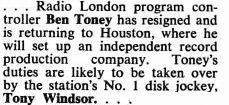 venture. However, before I left London, Don Pierson brought the Radio England/Britain Radio ship Laissez Faire into the UK. Don approached me about consulting for Radio England for a couple of months.
venture. However, before I left London, Don Pierson brought the Radio England/Britain Radio ship Laissez Faire into the UK. Don approached me about consulting for Radio England for a couple of months.
Billboard, April 16 1966
Ben's resignation is reported in Chris Hutchins' London Section of the 'International News Reports from the music capitals of the world'
My cost of living in London had been very high, and I had not been able to enjoy any of the social programmes that the locals drew on. Furthermore, my initial agreement with Don 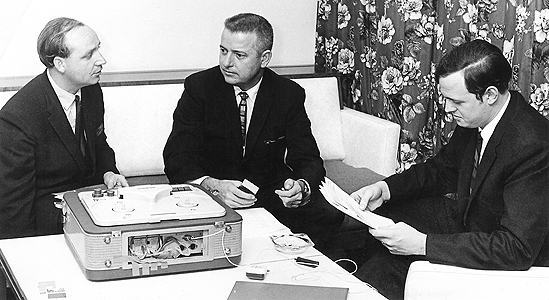 Pearson had been that as station manager I would receive a percentage of Radio London's gross income, but all this went by the way when Don was forced out of the company. Not only did my percentage agreement with Don go up in smoke, but also my job as manager. I had been allowed by the owners to remain as programme director, which I did because I was keen on putting Radio London on the air.
Pearson had been that as station manager I would receive a percentage of Radio London's gross income, but all this went by the way when Don was forced out of the company. Not only did my percentage agreement with Don go up in smoke, but also my job as manager. I had been allowed by the owners to remain as programme director, which I did because I was keen on putting Radio London on the air.
Right: Don Pierson (centre of photo) in a business meeting
In one sense, I had not been a very 'happy camper' for some months. Then again, all of this was a personal problem and it should not overshadow the fact that under my direction, Radio London became the world's largest commercial radio station, with an excess of 16 million listeners weekly.
When Don came forward with his Radio England offer, I immediately accepted. It would allow me to recoup some of my losses, and also allow me to make my move back to the States. My consulting job with Radio England ended up as consisting mainly of showing the Radio England programme director Ron O'Quinn about London and introducing him to members of the recording industry.
Any other ideas that I offered Don as a consultant were immediately dismissed. Don had his mind made up on how he would operate the stations and there would be very little input from any other source on that subject. So, in the end I collected my stipend from Don, took my young wife Ronagh in hand, along with her three poodles, and returned to America, where we located in Houston, Texas.
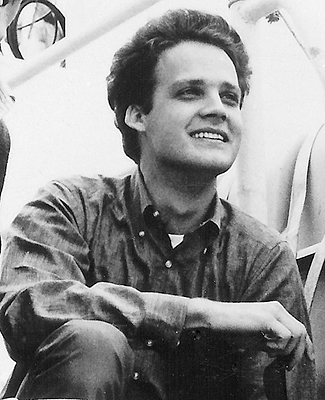 |
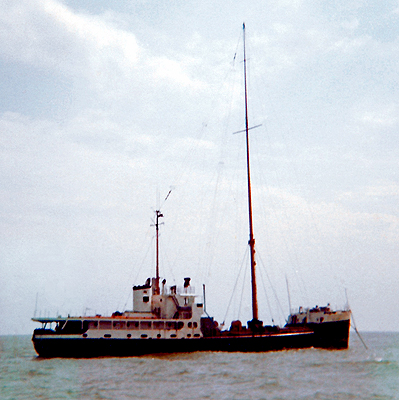 |
Radio England PD, Ron O'Quinn |
The Olga Patricia, renamed Laissez Faire |
Back to Texas
I had a class friend in Houston, Walt Andrews, who owned a recording company. Walt put me on to one of Houston's best pop groups, the Six Pentz. I ended up managing them for a time. However, there was a serious problem with this endeavour that I did not at first recognise. We were in the midst of the Vietnam War and all the members of my group were draft age. They were all attending college and had to keep up their grade levels in order to avoid being drafted. This meant that they could not travel to far-off venues and could not stay for long periods of time out of Houston. In the end, the Vietnam War not only took the lives of thousands of our young men, but it also made 'sacrificial lambs' out of me and the Six Pentz. I am certain that had they had a fair chance to play the venues I found for them, the Six Pentz would have been one of the top bands in America. It's uncanny how war affects the lives of so many people. My assessment is that war is no damn good!
Radio 270 and the Oceaan 7
After having spent about six months in Houston, Ronagh and I decided to return to London. Of course, one of the first people we went to see was our old friend Don Agnes of Leeds Music. Don put me on to one of his friends, the well-known band leader Cyril Stapleton. Cyril had some sort of connection with Radio 270 which operated off the Yorkshire coast and he asked me if I would be interested in doing some consulting work for 270. I agreed, so he called Wilf Proudfoot, the principal owner and manager of the station and Wilf agreed to take me on for a month or two.
Within a few days, Cyril and I made our way up to Scarborough by train, where we met with Wilf and several of his investors. They outlined their plans and gave me information on the station and the Oceaan 7, the converted Dutch lugger vessel on which 270 was located. During the ensuing weeks I spent some time on the Oceaan 7. I also went out into the field and talked to the listeners and potential clients. Finally, at the end of my investigation, I came to a conclusion that I was sure the 270 management would not want to hear. So instead, I gave them suggestions concerning their programming and a few hints about their signal strength, along with some sales tips.
My real thoughts on the subject were that Radio 270 was only allowed to exist through an act of God. Had I been straightforward with Wilf and his investors, I would have told them to take all the deejays and the crew off the Oceaan 7, plant a well-placed bomb below decks and blew it to kingdom come. Then I would have put a real ship out there in its place.
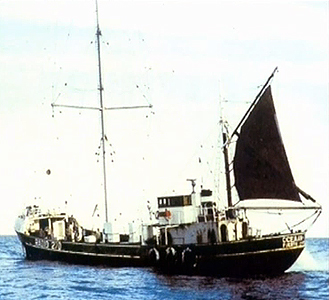 I am at a loss as to whether I should compliment the 270 deejays for their tenacity and endurance aboard the Oceaan 7 or whether I should recommend a good psychiatrist. Throughout my life, I have spent sixteen years at sea, and I can truthfully say that my few days on board the Oceaan 7 were the absolute worst I have ever endured.
I am at a loss as to whether I should compliment the 270 deejays for their tenacity and endurance aboard the Oceaan 7 or whether I should recommend a good psychiatrist. Throughout my life, I have spent sixteen years at sea, and I can truthfully say that my few days on board the Oceaan 7 were the absolute worst I have ever endured.
I really shouldn't be so hard on Wilf and his team. The owners of 270 were doing very much the same thing as the other offshore operations. They were all trying to stay afloat and make some money with the hope that one day the government would welcome them ashore, where their real profits would be realised. Well, unfortunately that day never came. August 1967 shut down most of the pirates, and it also shot down any dreams of the stations coming on land and presenting an American-style commercial radio format. There are still to this day many Brits trying to force the government's hand and secure a free radio service for the country.
There is an old saying in American politics for when dealing with the proletariat – "Throw them a bone!" That is exactly what the British government did to listeners. They changed the BBC Light Programme over to BBC Radio 1 and set up about a half-dozen well-manipulated commercial stations throughout the country. None of these stations to this day have served the British public to the extent that the pirates did.
There were two highlights to Ronagh's and my visit to Scarborough. First, while we were there, Wilf Proudfoot and his wife invited us over for dinner one evening. Wilf's wife prepared the best roast beef and Yorkshire pudding I have ever tasted. Wilf would have been far ahead of the game if he had opened a restaurant and put his wife in charge of the kitchen.
The other fantastic highlight to our visit to Scarborough was the discovery that Ronagh was pregnant with our daughter Racquel. What an exciting time!
All Radio England photos are courtesy of Grey Pierson.
******
Editor's note:
The Oceaan 7 was a 137ft converted Dutch fishing vessel built in 1939. Left unused for a decade, she had been purchased for £2,500. An £11,000 refit secured a Dutch certificate of seaworthiness but she did not have one for the UK. The 270 transmitter cost £7,000.
It is not clear exactly when Ben was employed as a consultant, but it seems his tongue-in-cheek suggestion to blow up the Oceaan 7 would have been sound advice. Although the backers had intended 270 to commence broadcasting on April 1st, the launch was beset with delays and disasters and the station did not get on the air till over two months later, on June 11th. 270 was dogged with problems throughout its 14-month life, which was cut short by the Marine Offences Bill in August 1967.
The above information is from Bob Preedy's book Radio 270 Life on the Oceaan Waves. Although the author cites Ben as an on-air presenter as well as a consultant, Ben's memoir does not mention his ever having broadcast from 270.